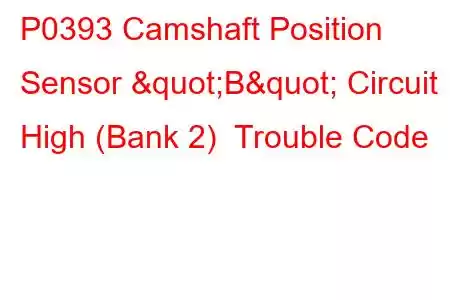P0393 Camshaft Position Sensor "B" Circuit Low Bank 2
OBD-II Trouble Code Technical Description
Camshaft Position Sensor B Circuit High Input (Bank 2)
What does that mean?
This is a generic powertrain diagnostic trouble code (DTC), which means it covers all makes/models starting around 2003. The code seems more common on Kia, Hyundai, Chevrolet, Toyota, and Ford vehicles, but any make vehicle can be affected.
Specific troubleshooting steps will vary depending on the vehicle.
These vehicles can have a single camshaft in block, or a single (SOHC) or dual (DOHC) overhead camshafts, but this code is strictly concerned about the incoming signal from the camshaft position sensor(s) "B" from Bank 1 being missing, typically at engine start up. This is an electrical circuit fault. Bank #2 is the bank of the engine that does not contain cylinder #1.
The PCM uses the Camshaft Position Sensor to tell it when the Crankshaft Sensor signal is correct, when a given Crankshaft Position Sensor signal is timed to Cylinder #1 for timing, and it is also used for fuel injector synchronization / start of injection.
Codes P0390 or P0391 may also be present at the same time as the P0393. The only difference between these 3 codes is how long the problem lasts and the type of electrical problem that the sensor/circuit/engine controller is having. Troubleshooting steps may vary depending upon manufacturer, type of camshaft position sensor and wire colors.
Symptoms
Symptoms of a P0393 engine code may include:
Check Engine Light on Bucking or Surging Dies out, but may restart if the problem is inconsistent May run fine, until it is restarted; then will not restartPotential Causes
Typically the causes for this code are:
Open in the ground circuit to the camshaft position sensor "B" on Bank 2 Open in the signal circuit between the camshaft position sensor "B" and the PCM Short to 5 volts in the signal circuit to the camshaft position sensor Occasionally-Camshaft Position Sensor faulty – internally shorted to voltageDiagnostic and Repair Procedures
A good starting point is always a technical service bulletin (TSB) search for your particular vehicle. The vehicle manufacturer may have a PCM flash/reprogram to cover this issue, and it pays to check on this before you find you’ve gone down a long/wrong path.
Next, locate both Camshaft and Crankshaft Position Sensors on your particular vehicle. Since they share common power and ground circuits, and this code focuses around the power and ground circuits of the Camshaft Position Sensor, it only makes sense to check them to see if there is damage to either one. Once located, visually inspect the connectors and wiring. Look for chafing, rubbing, bare wires, burn spots or melted plastic. Pull the connectors apart and carefully inspect the terminals (the metal parts) inside the connectors. See if they look corroded, burnt or possibly green in color versus the normal metal color you are probably used to seeing. You can get some Electrical Contact cleaner at any parts store if cleaning of the terminals is needed. If this is not possible, find some 91% rubbing alcohol and a light plastic bristle brush to clean them with. Afterwards let them air dry, get some dielectric silicone compound (same stuff they use for light bulb sockets and spark plug wires) and put some where the terminals come into contact.
If you have a scan tool, clear the diagnostic trouble codes from memory, and see if this code returns. If it does not, then the connections were most likely your problem.
If the code does return, we will need to test the sensor and its associated circuits. Typically there are 2 types of Camshaft Position Sensors: Hall Effect or Magnetic Pick up. You can typically tell which one you have by the number of wires coming from the sensor. If th
Read: 39


